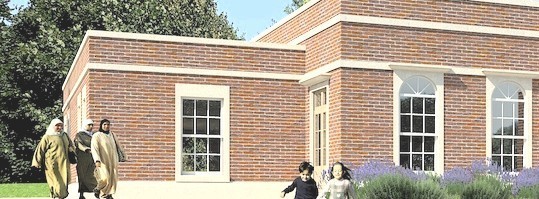
Our home group has a brief constitution statement that includes ‘finding out about other faiths’, and on a grey and drizzly afternoon in November, eleven of us had the opportunity to visit the Al Mahdi Centre Mosque in Funtley, near Fareham. Our host for the visit was Sheikh Fazle Abbas who is the Resident Alim / Imam. We removed our shoes on entering and we had been previously advised on certain protocols to observe. This included requests that the ladies should cover their heads and that opposite genders (not related by blood or matrimony) should refrain from any physical body contact such as hand shaking. We were told that the community is a Shia Muslim organization whose membership extends from Brighton in the east to Weymouth in the West. It was formed in 1982 by a group of Shia Muslims who had settled in Portsmouth having originally come to this area from Tanzania as students to study at what is now Portsmouth University.
The present 5-acre site was acquired in the early 1990’s and transformed from a light industrial unit and it currently serves approximately 80 families. The building is single story with pleasant rural surroundings. Imagine two parish halls side by side with adjoining classrooms and a large central kitchen. Food clearly plays a big part in this worshipping community! We noticed from the classrooms that there is a strong focus on the teaching of children. Men and women worship separately and even have their own entrances into the mosque. The building was warm and welcoming with plush carpets and we were intrigued to hear that the heating is provided by a ground source heat pump that extracts warmth from a network of underground pipes. With solar panels on the roof, and good insulation, this is a truly sustainable building! These various initiatives helping to conserve of the environment are a witness to the faith of Islam where, like Christianity and other faiths, Muslims also believe that we are charged with stewardship of all creation.
So, what did we learn about the Islamic faith? Well, the first point is that we worship the same God; Islam, like Christianity is a monotheistic faith. The Arabic name for God is Allah, just as the French word for God is Dieu. Thus Muslims who speak Arabic use the word Allah for God as also do Christians of Arab origin.
The nature of God, as far as we understand it, is the same, ever loving, full of grace and mercy.
The religion developed in the 7th century AD, with Muhammad as the final prophet upon whom the Quran was revealed. Among the obligations Muslims are expected to pray five times each day, facing towards Mecca in Saudi Arabia. We do however differ on who Jesus was. Although Muslims recognise him as a prophet and believe in the virgin birth, for them he is not the Son of God.
This was a fascinating and educational visit, and while there are fundamental differences in our beliefs, we also have a great deal in common, not least in our belief in God and our striving for peace, justice and care for the environment. Such visits can go a long way to help our understanding of other faiths and particularly in these difficult times can help us proclaim a message of love and peace. There is more information at www.almahdi.org.uk particularly in the history section.
James Mant
